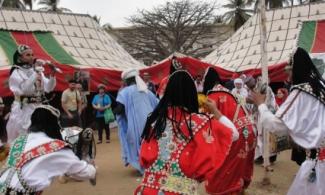
We landed in Dakar at two o’clock in the morning to a cooler than expected ocean breeze. Compared to the 40 degree Celsius Abuja weather, it was a welcome surprise. I arose the next day to an amazing view of Senegal's coastline with dramatic cliffs and clear aquamarine waters, and I bubbled with excitement waiting for my participation in the World Social Forum to unfold.
googletag.cmd.push(function() { googletag.display('content1'); });
We landed in Dakar at two o’clock in the morning to a cooler than expected ocean breeze. Compared to the 40 degree Celsius Abuja weather, it was a welcome surprise. I arose the next day to an amazing view of Senegal's coastline with dramatic cliffs and clear aquamarine waters, and I bubbled with excitement waiting for my participation in the World Social Forum to unfold.
googletag.cmd.push(function() { googletag.display('content2'); });
The forum is a convention of activists, freedom fighters, independence seekers, revolutionaries and NGOs where minds meet to discuss and exchange ideas on the fight to divert from capitalism in an effort to create a more equal world. I initially expected mostly anti-economics individuals, but what we found were groups fighting for equality, completely dissociated with economics.
Having landed on Tuesday the 8th, we regrettably missed out on the speeches of Bolivian President Evo Morales, and Brazil's former President Luiz Inácio Lula da Silva, along with the marches of several groups.
The World Social Forum was held on the vibrant campus of the Université Cheikh Anta Diop de Dakar, where students swarmed the sidewalks and peered curiously into the various tents advocating various issues. There was something to be said about the engagement of the students. While the forum was occupying space on their campus, they flocked to various roundtables, eager to hear from the organizations and actively participate in the discussions they could understand. The official languages of Senegal are French and Wollof, and most seminars were held in English.
One of our early first roundtable was with the LGBT Equality Project, which discussed homophobia in Africa. On the Africa continent, no many really-openly- thought about LGBT rights in the African context, and had certainly never heard it discussed in such depth except in hushed tones. The meeting consisted of mostly female participants, driving the discussion towards gender rights as it pertains to female rights, and enabled understanding of the connection between the two, and how they are almost interchangeable, as they both deal with reproductive rights, property rights, etc.
The uptown sector of Dakar held the convergence of IndyMedia Convergence Center which served as housing for several African independent media practictioners, and our activists fighting for the equality of females in the Niger Delta region. It was interesting hearing the views on race, human rights, equality and the future of journalism in Africa. The Niger Delta women from the groups Kebetkache Women Development and Resource Center, and African Woman Renaissance project gained a great platform in discussing their suffering and inequality derived from the destructive oil fields, the damage done to their livelihoods, and the sexual assault on the women by soldiers occupying the region.
The spirit of the people in Dakar blew us away. They were kind, honest, respectful, and proud of Senegal. But they were also looking for a change from their 10 year dictatorship under President Abdoulaye Wade. When I mistakenly overpaid a cab driver, giving him ten-fold my fare, he came to find me in the restaurant I was in and gave my money back. I was shocked and terribly grateful for his act of kindness.
Outside of the conference, we took time to discover what Senegal had to offer, taking strolls through the commercial center in the downtown neighborhood, to a trip the coastal city of Parcel, and to Goree. The island of Goree is a former slave port where individuals and groups of black Africans sold into slavery were held before they were shipped off to the Caribbean and the Americas. The island was preserved to not only serve as a tourist destination, but to teach the Senegalese and outsiders of the inhumanity, and cruelty imposed for centuries on the African community.
The forum closed out with a massive concert featuring Youssou N'Dour. The multiethnic crowd went wild, mesmerized by the legend’s presence. The concert also featured other conscious speaking hip hop acts from around the country. I was surprised at the massive support of the campus for the Palestinian movement. One singer sang in Arabic, and there were chants in support of Palestine. Later that night we learnt that the Egyptian government had fallen, Mubarak was no more! Egyptians that had staged a revolution at Tahrir Square finally won!
Through our trip at the forum we were blessed to meet several extraordinary individuals genuinely looking to make the world a better place for everyone to live in. From the displaced women of the Sierra Leonean war still sharing their stories, and the joyful songs that kept them going through their suffering, to students from the West eager to discover Africa, and locals who went out of their way to make sure we got the most out of Dakar, the World Social forum proved to be a truly exhilarating experience.
googletag.cmd.push(function() { googletag.display('comments'); });